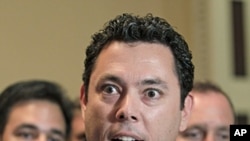The U.S. House of Representatives has passed a bill tying an increase in the federal borrowing limit to deep spending cuts, limits on future spending, and a proposed constitutional amendment requiring a balanced budget. The Republican-sponsored measure is expected to fail in the Democratically-controlled Senate, leaving the United States without a clear path to deficit reduction as the clock ticks toward a possible default on America’s $14.3 trillion national debt.
The Cut, Cap, and Balance Act passed on a mostly party-line vote in the Republican-controlled chamber. The bill would cut non-defense federal spending, limit future spending to less than 20-percent of America’s gross domestic product, and require a constitutional mandate that the United States balance its books every year. It would extract significant savings from so-called entitlement programs that provide income and health care to retirees, but would not increase revenues.
In an era of massive federal deficits, ballooning national debt, and a stagnant economy, Republicans say strong medicine is required. House Budget Committee Chairman Paul Ryan:
“We cannot keep spending money we do not have," said Ryan. "Forty-two cents out of every dollar coming out of Washington is borrowed money, 47 percent of it from other countries, China number 1 [most of all]. Mr. Speaker, you cannot have sovereignty, self-determination as a country if we are relying on other governments to cash-flow [finance] half of our deficit.”
Democrats, like Representative John Yarmuth of Kentucky, said the measure would place the full burden of fiscal austerity on America’s poor and vulnerable.
“What Cut, Cap, and Balance would really mean is slash, shred, and punish," said Yarmuth. "Slash the budget, shred the safety net, and punish American citizens who can least afford it. All while protecting the wealthiest, most successful [people].”
Most observers view the bill as an academic exercise designed to appease the ultra-conservative Tea Party wing of the Republican Party. The bill is highly unlikely to pass the Senate, and would face a presidential veto even if it did.
At the White House, President Barack Obama barely mentioned the Cut, Cap, and Balance Act, focusing instead on a new plan put forth by a bipartisan group of Senators, the so-called Gang of Six. The president hailed the plan’s inclusion of spending cuts, entitlement reforms, and tax provisions - what Obama called a balanced approach to deficit reduction.
“We now have a bipartisan group of senators who agree with that balanced approach," said President Obama. "And we have got the American people, who agree with that balanced approach.”
The president urged congressional leaders to turn the plan into a bill that could be voted on as soon as possible, noting that the clock is ticking towards an August 2 deadline for raising the federal borrowing limit. Without action, the United States risks defaulting on its debt obligations.
Speaking with reporters, the Senate’s top Republican, Mitch McConnell, would only say that the Gang of Six proposal merits consideration. On the Democratic side, Majority Leader Harry Reid praised the work done by the Gang of Six, but questioned whether enough time exists to enact the gang’s far-reaching proposal before August 2, given the often-cumbersome rules that govern Senate proceedings.
“I do not want to do anything to jeopardize the enthusiasm people have for the Gang of Six," said Reid. "But I understand what the rules of the Senate are.”
Senators Reid and McConnell have been working on a plan of their own that would allow President Obama to raise the debt ceiling in installments without majority votes in Congress. It is seen as a fallback plan in the event that debt negotiations fail. If enacted, it would avert the immediate threat of default, but would do little to fix America’s long-term fiscal woes.
Bill to Raise US Debt Ceiling Advances - For Now




